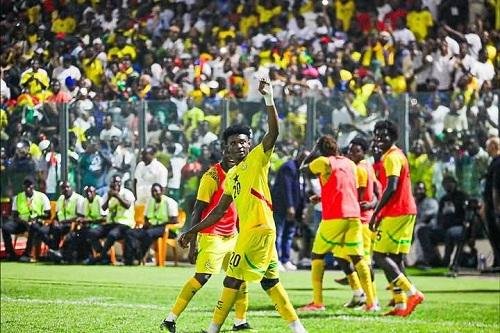Sports
Why local footballers struggle to break into Black Stars

DESPITE producing some of the most talented footballers on the continent, Ghana’s senior national team, the Black Stars, has long been criticised for overlooking local talent.
While players plying their trade in top European leagues regularly feature in the team, those cutting their teeth in the Ghana Premier League (GPL) and other domestic competitions often find themselves left out in the cold.
This trend raises important questions about the selection process, talent identification, and the role of local football in nurturing the next generation of Black Stars.
This article seeks to explore the reasons behind this phenomenon and examine the implications for Ghanaian football as a whole.
Reasons
Lack of exposure: Local footballers may not get the same level of exposure as their European-based counterparts, making it harder for national team coaches to notice them.
Preference for European-based players: Coaches may prefer players with experience in top European leagues, perceiving them as more skilled and battle-hardened.
Limited scouting: Insufficient scouting efforts in local leagues might lead to talented players being overlooked.
Competition: The level of competition in local leagues might be perceived as lower compared to European leagues.
Player migration: Many talented Ghanaian players migrate to foreign clubs at a young age, making them more visible to national team selectors.
Selection bias: Coaches might have preconceived notions or biases towards certain players or leagues.
Infrastructure and resources: Local clubs might lack the infrastructure and resources to develop players to their full potential.
Media: Media and public expectations might influence selection decisions, favouring more high-profile players.
Implications for local players
Demotivation: Constantly being overlooked can demotivate local players, affecting their performance and enthusiasm.
Limited opportunities: Lack of representation in the national team limits opportunities for local players to gain international exposure and experience.
Exodus: Frustrated local players might seek opportunities abroad, potentially weakening the local league.
Stunted development: Without national team experience, local players might miss out on high-level coaching, training, and competition.
Loss of confidence: Repeatedly being passed over can erode a players’ confidence in their abilities.
Career impact: Not making it to the national team can impact a players’ career prospects and earning potential.
Perception of inadequacy: Local players might feel their talent and hard work aren’t recognised or valued.
Brain drain: Top local talents might be lured away by foreign clubs, depleting the local league’s quality.
Implications for local clubs
Financial impact: Local clubs might lose revenue from transfer fees and sponsorships if their top players are consistently overlooked by the national team.
Decreased visibility: Lack of national team representation can reduce local clubs’ visibility and exposure, making it harder to attract fans, sponsors, and top talent.
Demotivation of players, coaches: If local clubs’ players are consistently overlooked, it can demotivate coaches and players, affecting team performance and morale.
Talent drain: Local clubs might struggle to retain top players who seek opportunities abroad, weakening the league’s overall quality.
Loss of pride, prestige: Not producing national team players can diminish local clubs’ pride and prestige, impacting their reputation and fan support.
Reduced investment: Investors and sponsors might be deterred from supporting local clubs if they don’t see a clear pathway to national team representation.
Stunted League development: The local league’s growth and competitiveness might suffer if top players aren’t given opportunities to develop and showcase their skills at the national level.
Impact on fan engagement: Fans might lose interest in local clubs if they don’t see their favourite players represented in the national team.
Implications on GPL
Decreased competitiveness: Lack of national team representation for local players might lead to decreased competitiveness and quality in the league.
Loss of top talent: The league might struggle to retain top players who seek opportunities abroad, weakening its overall strength.
Reduced fan interest: Fans might lose interest in the league if they don’t see their favourite players represented in the national team.
Financial impact: Reduced interest and visibility could lead to decreased revenue from sponsorships, broadcasting rights, and ticket sales.
Stunted growth: The league’s growth and development might be hindered if local players aren’t given opportunities to showcase their skills at the national level.
Perception of inferiority: The league might be perceived as inferior, deterring top players, coaches, and investors from participating.
Impact on sponsorship: Sponsors might be hesitant to invest in the league or local clubs if they don’t see a clear return on investment.
Talent development: The league’s ability to develop and nurture young talent might be compromised if players aren’t exposed to high-level competition.
Solutions
Increased scouting: National team coaches and scouts should regularly attend local league matches to identify and talent-spot.
Local League development: Invest in improving local league infrastructure, coaching, and resources to enhance player development.
Exposure opportunities: Create more opportunities for local players to gain international exposure through friendlies, tournaments, or training camps.
Merit-based selection: Ensure national team selection is based on merit, talent, and form, rather than bias or reputation.
Local talent identification programmes: Establish programmes to identify and nurture young talent in local clubs and Leagues.
Collaboration between local clubs and national team: Foster closer relationships between local clubs and the national team to facilitate player development and selection.
Coaching and training: Provide local players with access to high-quality coaching, training, and resources to enhance their skills.
Media and public awareness: Raise awareness about the importance of local talent development and the potential of Ghanaian players.
Player development pathways: Establish clear pathways for local players to progress to the national team, including youth development programmes.
Review selection process: Regularly review and refine the national team selection process to ensure fairness, transparency, and merit-based selection.
Conclusion
In conclusion, the struggles of Ghanaian local footballers to break into the Black Stars are a complex issue rooted in various factors.
However, by acknowledging these challenges and implementing solutions that promote local talent development, increase exposure opportunities, and ensure merit-based selection, Ghanaian football can unlock the potential of its local players.
It’s time to give local talent a chance to shine on the biggest stage.
By doing so, we can strengthen the Black Stars, revitalise the local league, and inspire a new generation of Ghanaian footballers. The future of Ghanaian football depends on it.
By Seth Armah Casillas
Join our WhatsApp Channel now!
https://whatsapp.com/channel/0029VbBElzjInlqHhl1aTU27
Sports
Asempa FM apologizes to Sports Minister Kofi Adams

Management of Asempa FM has issued a public apology to the Minister of Youth and Sports, Mr. Kofi Adams, after wrongly quoting him in a recent publication about the selection of players for the Black Stars.
In a statement released by the station’s management, Asempa FM admitted that a quote card shared after Kofi Adams’ interview on Ultimate Sports Show on 13th October 2025 misrepresented his actual remarks.
According to the station, the error created a wrong impression that the Sports Minister was directly involved in selecting players for the national team ahead of the 2026 FIFA World Cup.
“The wording on the artwork may have created a misleading impression. For clarity, the Honorable Minister stated that the final decision on player selection rests solely with the technical team, and he emphasized the importance of transparency and merit-based selection,” the statement said.
Asempa FM expressed deep regret for the misrepresentation and apologized to Kofi Adams and the Ministry of Youth and Sports.
The management further assured the public that the station would take steps to ensure greater accuracy and care in its future communications.
“We hold Kofi Adams and his office in the highest regard and deeply regret any inconvenience or misunderstanding caused,” the statement concluded.
By: Jacob Aggrey
Sports
From Fourth to First – Ghana’s Dramatic Turnaround Under Otto Addo

When Otto Addo took charge, Ghana sat fourth in Group I with just three points from two matches — a situation that seemed daunting for even the most optimistic fans. But what followed was one of the most remarkable turnarounds in African World Cup qualifying history.
Addo’s arrival brought renewed tactical clarity and belief. He restructured the team’s shape, redefined roles, and instilled discipline in both defense and attack. The results began to flow as Ghana went on an astonishing run of victories.

The coach’s calm leadership was crucial in restoring confidence to key players who had lost form. Veterans found new motivation, while youngsters flourished under his guidance, creating a perfect blend of maturity and energy.
Each win became a statement of intent — that Ghana was back. The team’s comeback victories over tough opponents like Mali and Central African Republic showed resilience and mental fortitude.


By the end of the campaign, the Black Stars had climbed from fourth to first, topping the group with 25 points and a +17-goal difference — a clear testament to Otto Addo’s transformational leadership.
This turnaround will go down in Ghana’s football annals as a story of hope, determination, and tactical brilliance that brought the nation back to the world stage.
GFA COMMUNICATIONS






